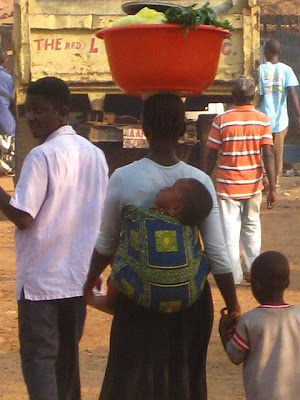
Every time that I see a diamond now, whether it is on some one’s finger, in some one’s ears, around some one’s neck or displayed in a store, brief thoughts on the following thoughts flash through my mind:
After our long day in Tonga at the diamond mind, the owner of the hotel that we were staying at in Makeni came to speak with us, as he is also a diamond mine owner. It was very hard to ask him questions, especially since we were still recovering from the days emotions of shock and frustration. He avoided most of our questions and instead spoke about himself as a Lebanese business owner in Sierra Leone, and how he having lived over 40 years in this country made him more Sierra Leoneon than other people. When he did manage to speak towards our questions on the seemingly injustices of the mining industry in Sierra Leone, he was often extremely defensive and impatient with us, even though we did not ask any confrontational questions. All in all, it was useful to get his perspective of the mining situation and it did help to balance out my thoughts and emotions after coming back from the mine in Tongo.
My own conclusions are that many mining areas do in fact have horrible working conditions. The workers are out in the sweltering sun from 8am-4pm, waist deep in murky water, wearing next to nothing and often do not stop to eat. The hotel owner, said that all of his workers are provided medications and rushed to the hospital if they get hurt, but I have an inclination that this is not the norm for mine workers. The mine that we visited had been previously mined by an international company, and was now in the hands of the local chiefdom. Thus, all of these workers were independent and as I found out had no medical insurance and there were no safety regulations or age limit enforced. The workers were really in a frenzy when we arrived. They wanted to know if we were here to buy diamonds and why a group of 14 white people were trudging across the sand dunes where they were working. When a local journalist who had accompanied us, started broadcasting our interview over the air, the workers calmed down and became quite attentive to what we were asking. I accept that many of the workers’ statements could have been exaggerated, because they were so excited to be broadcast on the radio about their work situation. But standing there in the humidity and intense heat beating down on us, and seeing firsthand the work these guys do, I could only feel outraged, frustrated and angry about what was taking place here.
Mining is very dangerous work in general, and as some Sierra Leoneons that I spoke with both stressed, it is like gambling. The miners go each day with the hope that they will find the ‘big one’. We saw the workers pull out some diamonds and other precious stones from the sand dunes. The one diamond was minuscule. Anything of value from this dusty, barren area, was found a long time ago. The hotel owner told us that diamond mining in Sierra Leone finished over ten years ago and over 90% of the valuable diamonds have been mined. But there still remains this ‘hope’ amongst workers that if they can only find that one diamond that will make them rich, they will never have to work a single day again. Instead, the reality is that most of them slave away their entire lives, never finding anything of value, and even if they do, they have no way of telling how much it is worth, and get ripped off by the nearest dealer. And even though most of the workers expressed this frustration more or less, they also cried that they had no other options to find better work. And having spent a day in Tongo, I understand their hopelessness and despair.
I am angered that the government has not done more to either instill within society that diamond mining is a fruitless game, or at least provide basic protection and a system to organize the mines that remain in operation. When asked if there were apart of any union, the workers laughed, as if this would be the last thing that they would do. Apparently the union is not representative of the workers. There was no form of organization amongst the workers to demand better conditions or benefits.
Unless Sierra Leone can control the finishing and processing of the diamonds that it possesses, the people will never see any of the benefits from this luxury industry. Sierra Leone only receives 3% of the revenue from its diamonds. Most importantly, corruption has to be fought within the government to allow mining workers to get basic benefits of health insurance and sustainable pay. The hotel owner believed that Sierra Leone should stop all efforts to mine diamonds and instead put its resources in growing its agricultural sector. I do not agree that agriculture is the solution to all of Sierra Leone’s problems of poverty and development, but the business of mining is certainly an inherent problem.
I spoke with the radio journalist for a while at the mine and learned that the only form of organization or protest the workers engage in, is violence. I believe that at this visit it became clear to us why and how the civil war started here, at the mines, and why it became so chaotic, violent and mission-less. The desperation, anger and frustration at this mining area was seething through these workers skin, eyes and voices. It was easy to see how another conflict could develop when there remains so much anger and despair. I was shaken.




